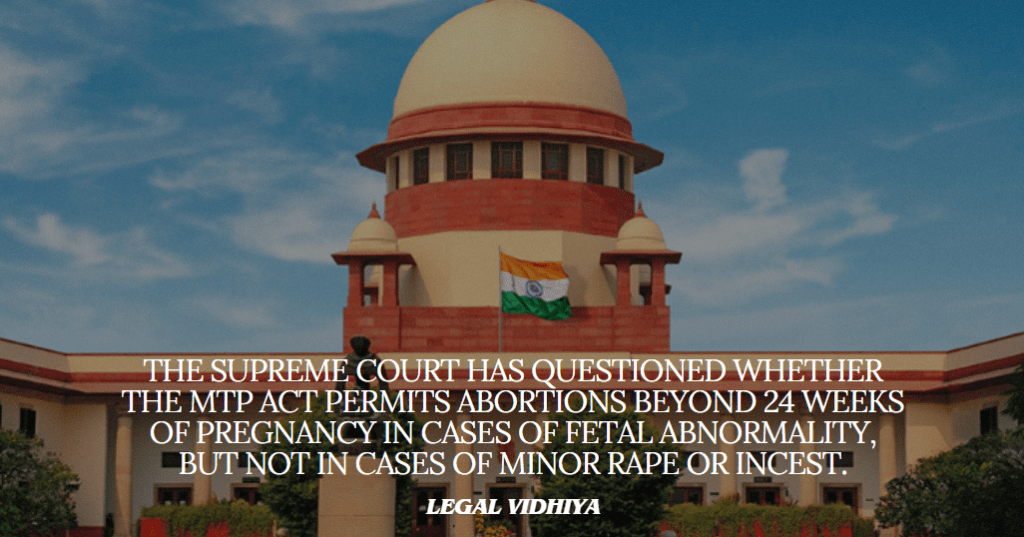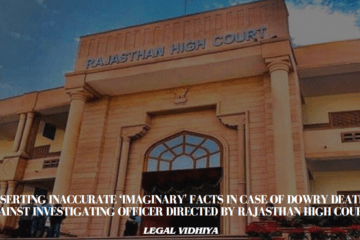
In a recent decision, the Supreme Court expressed concerns about the Medical Termination of Pregnancy Act’s ban on ending a pregnancy for minors who have experienced rape or incest before 24 weeks, but allowed for the termination of such pregnancies in the event of notable foetal abnormalities. According to the Court, the legislature seems to have decided that a fetus that is noticeably abnormal will injure a pregnant person more severely than the rape.
The Court made reference to MTP Act Section 3(2B) and said:
“The provision is arguably suspect on the ground that it unreasonably alters the autonomy of a person by classifying a substantially abnormal fetus differently than instances such as incest or rape.”
The possibility of conducting a proper investigation into this matter in the event that it became necessary was also mentioned.
Chief Justice of India Dr. DY Chandrachud, along with Justices JB Pardiwala and Manoj Misra, made up the bench that was considering the minor’s case. In it, she sought a medical termination of her pregnancy due to sexual assault. Refusing to back down, the Medical Board continued the case even after the girl’s mother filed an appeal with the Bombay High Court, claiming the child was gesta and no congenital abnormality had been discovered.
Initially, the Bombay High Court’s order was overturned by the top court, allowing the minor girl to undergo a medical termination of her pregnancy even though she was in her thirty-first week. After finding out about the dangers of terminating the pregnancy at an advanced stage, she and her parents subsequently expressed a change in perspective. The Court decided to practice the case as a result.
Putting aside the specific facts, the court declared that regardless of whether there are noticeable fetal abnormalities, any pregnant person who approaches a constitutional court after the gestational age of twenty-four weeks must get an assessment of their physical and mental health from the medical board established under the MTP Act.
On this particular occasion, the court also underlined that the MTP Act specifies two scenarios in which the duration of pregnancy for a given term is not limited.
It was contended that the clause, by treating a significantly abnormal fetus differently than situations such as rape or incest, unfairly alters an individual’s autonomy.
“The legislation has made a value judgment in Section 3(2-B) of the Act, that a substantially abnormal fetus would be more injurious to the mental and physical health of a woman than any other circumstance. To deny the same enabling provision of the law would appear prima facie unreasonable and arbitrary. The value judgment of the legislation does not appear to be based on scientific parameters but rather on a notion that a substantially abnormal fetus will inflict the most aggravated form of injury to the pregnant person”.
Here is a sample of the conclusions the court reached in its ruling:
(i) When the RMP and medical boards make a decision about pregnancy termination in good faith, they are protected by the MTP Act;
(ii) Rather than relying solely on the guidelines provided in Section 3(2-B) of the MTP Act, the medical board must now take the pregnant person’s physical and mental health into account when deciding whether to end the pregnancy in light of the ruling;
(iii) The Medical Board must provide a plausible explanation for any change in opinion and circumstances when providing a clarifying opinion;
(iv) Obtaining the consent of the expectant individual is essential when making decisions regarding reproductive autonomy and pregnancy termination. When the opinions of the pregnant person and her guardian diverge, the viewpoint of the minor or mentally ill pregnant person must be taken into account as a critical component in order for the court to make a decision.
Case Title : A (Mother of X) v. State of Maharashtra
Name:gurleen kaur , bba llb ( 6th sem) , st. soldier law college. , intern under legal vidhiya.
Disclaimer: The materials provided herein are intended solely for informational purposes. Accessing or using the site or the materials does not establish an attorney-client relationship. The information presented on this site is not to be construed as legal or professional advice, and it should not be relied upon for such purposes or used as a substitute for advice from a licensed attorney in your state. Additionally, the viewpoint presented by the author is of a personal nature




0 Comments